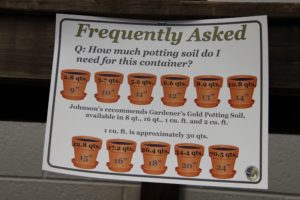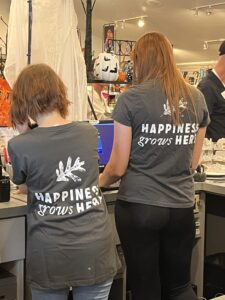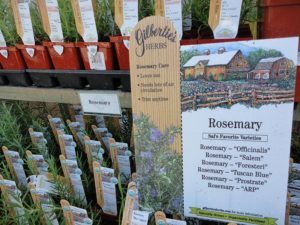Exploit Your Differences
Home stores and mass merchants provide stiff competition for independent retailers in virtually all categories. The “boxes” have become experts at transaction selling, providing low-cost and convenient product solution, and processing hordes of customers. Now, home centers in particular are taking aim at independent garden centers (IGCs). (See the Wall Street Journal article “The War of the Roses: Home Depot, Lowe’s Ramp Up Service, Plant Variety in Effort to Outdo Local Garden Shops,” March 3, 2005.)
Surviving and thriving as an IGC in this environment requires that operators forever give up their business models of the past. According to Dave Wright, president of Kimberly Nurseries, Twin Falls, Idaho, “The boxes now have the market share that we used to enjoy.”
Product Selections
Independents must be quick to slough off non-profitable items and categories and become more sophisticated at watching trends. Brad Corso, the nursery, landscape and purchasing manager at Corso’s Flower and Garden Center, Sandusky, Ohio, said, “We like to stay ahead of the curve for new product introductions, especially in the hard goods area. In the first year, a product starts to be popular with early adopters. Those customers come to Corso’s, notice something new and exciting, and are willing to pay for it. If it looks like the product could really take off, we load up for the second year. By the third year, we drastically reduce our buying or get out of it completely, since by this time, the box stores have caught on, and they are selling at a discount.” Corso cites icicle lights, chimineas and aboveground fire pits as examples. Every independent operator can probably add a dozen more.
Independents, for the most part, cannot compete on price and “make it up on volume.” Kimberly Nursery long ago abandoned any hope of selling mass quantities of low-margin items such as low-end stepping-stones, pre-formed edging, wall blocks and 1-gal. nursery stock.
The trend, instead, is on high-quality and unique selections. Todd Haller, nursery manager at Strange’s Florists and Garden Centers, Richmond, Va., is especially tuned in to “buying to beat the boxes.” Haller buys from 60 different nurseries and subjects every purchase decision to three prioritized criteria: quality, selection and price. He is keen on new varieties. Haller has been a major force in educating consumers on the three-season benefits of tropical varieties in a cold climate.
Many IGCs, in addition to retail, have diverse business interests such as landscaping, growing and Á re-wholesaling. Floral departments and pet sections provide a customer and revenue stream off-season. Well run, these additional areas provide more value and a wider customer base. However, you have to keep a keen eye on all of your categories and offerings. As Wright points out, “You can’t be emotional about your business. Get rid of non-functioning departments.” After a seven-year run, only two of which were very profitable, Kimberly abandoned one of its businesses, the spray department.
Owner Involvement
One industry insider advised this writer years ago that the first word in independent garden center is independent. It was a great lesson for us at Monrovia, as we designed and attempted to offer our series of training programs to our retail customers. That factor the independence is the secret ingredient in many successful operations, as each owner puts his or her own stamp on the operation. Sam Walton understood this, even though he ran a multi-billion dollar corporation. On closed-circuit, nationwide “Wal-Mart TV” appearances he would make employees raise their hands and pledge to do something, “So help me Sam!” Many IGCs tap into the powerful intangible of positive owner involvement with great results.
“One thing that truly sets us apart from box stores is the fact that the owners are directly involved in the day-to-day activities of the business. They are onsite, visible and available to answer questions,” explained Haller. “They work with the managers and buyers to help us expand our decision-making powers through weekly meetings and one-on-one talks as to how our departments are doing and the direction that we are going. They allow us almost free run of our departments with the knowledge that we are accountable. Not only do they provide us with the information necessary to make decisions, but they also teach us how to read and study that information. I feel as though I own the nursery and work accordingly. A lot of that is due to the support that the real owners give.”
Employee Relations
What do other owners do to build teamwork and continually refuel employee morale?
Bill Van Wilgen, owner of Van Wilgen’s Garden Center, North Branford, Conn., maintains an innovative bonus system for managers based on the attainment of year-round monthly goals. As a reward for a successful 2004 he took his entire management team, plus companions, on a Caribbean cruise. He regularly provides department managers with movie passes and ice cream store tickets, to use as spontaneous rewards for deserving employees.
Corso says he has family and “extended family” serving customers. Six owners, 10 family members and a core of 25-30 yearly employees lend stability to the operation. Customers often come in and ask for specific individuals but can be helped by anyone because of a free-flowing culture of continuous communication among the owners and employees. “Input from employees goes directly to the ownership, and decisions can be made and actions taken immediately,” Corso says.
“When it’s good, there is nothing better than family involvement in the business,” says Wright. “When it’s bad, there is nothing worse.” The senior Wright, Dave’s father, assigned different areas of the business to different family members. Today, Wright’s sister, Teresa, runs the gift shop, greenhouse and bedding plant areas. A non-family member runs the retail nursery. Wright is in charge of landscaping, buying and general oversight of the whole operation. This distribution of responsibilities prevented a lot of friction over the years.
“You have to be conscious of the feeling in the store,” Wright says. You know when you’ve lost it. I’ve been there when it’s not happening.” To make sure Kimberly Nursery does not lose that friendly feeling, he injects a healthy dose of fun into employee meetings. At the end of spring, the whole staff plus companions comes to bowling night, where a prize is awarded for both the high and the low scorers. Around Christmas, Wright drives everyone to the mall on a huge bus. Armed with gift certificates, all are instructed to buy a gift for themselves. When they come back on the bus, each person has to show what they bought. “It’s a great way to wind up a Christmas party,” Wright says. Summer picnics and a Mexican fiesta round out the year.
Supplier Relations
You might think the box stores have all the leverage with suppliers. The advantage IGCs have is that both parties, on a local basis, have the opportunity to get creative in moving product. Jerry Gross, who was the general manager and co-owner of Drake’s 7 Dees in Portland, Ore., for 25 years, built his business in part by partnering with any supplier who would meet him half way. “A lot of it depends on the local sales representative,” Gross explained. “We had a Monrovia sales representative who was an advocate for us and obtained the displays and promotional material we needed to succeed with the line.” As a result, the store had a “Monrovia Park” featuring all Monrovia cultivars. It provided a pleasant experience for the customers and good, high-margin business for the store.
Employee Advantage
Employee knowledge, behaviors and attitudes are the most critical part of your store’s image and style. Having a core group of certified nursery professionals is important for your credibility as an expert solution provider, especially at the information desk. However, having high-level technical skills with undeveloped people skills can spell trouble. As Wright said, “The people must have a love of the industry, but not everyone has to be an expert. I put my money in the relationship. I’ve had lots of high-level horticultural people fail.”
Most IGCs do not have a dedicated trainer on staff. Owners, family members and senior employees train on the job and in small meetings throughout the year with the flexibility to address current customer concerns. This season, Corso’s is receiving several calls a day asking about spider mites. In response, the company has dedicated a large part of its weekly manager meetings to addressing this issue when customers call.
Sources for more training are as varied as the IGC’s supplier base and include the availability of extension agents, community colleges and industry consultants. Tim Parker, general manager at Plymouth Nursery in Plymouth, Mich., recently took advantage of two of these programs for the entire sales and management staff. He holds “train-the-trainer” sessions on a continuing basis for managers, who are responsible for holding short employee training sessions throughout the year.
Marketing Your Uniqueness
On a huge billboard next to one of the busiest highways in Connecticut, just a few miles from Van Wilgen’s Garden Center, the owner poses next to a new variety he is introducing this year, the “Cutie Pie.” The billboard humorously connects Van Wilgen’s “mug shot” and the glorious, colorful plant. Van Wilgen said he has been taking abuse like that for many years, and he loves it because everybody talks about it. When shoppers come to the garden center they are greeted by innovative architecture, including a heated plants-room floor, covered walkways, extensive indoor/outdoor greenhouses and multiple cash-outs in the sales yard. Van Wilgen’s links his vast collection of Farm-All tractors, a passionate hobby of his, to special events and festivals.
Perhaps the common thread running through all our examples is the “fun thing.” Customers know when you and your staff like what you’re doing, and they also know when you are just pushing product on them. Stay involved. Keep it interesting for you. Stay tuned to every aspect of your business at micro, macro, people, product and promotional levels. This is how independent garden centers can stay “independent.”


















 Videos
Videos





